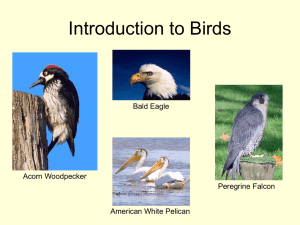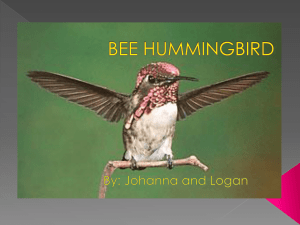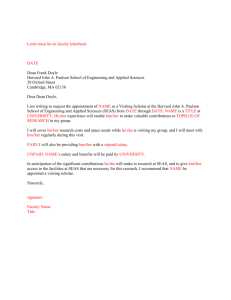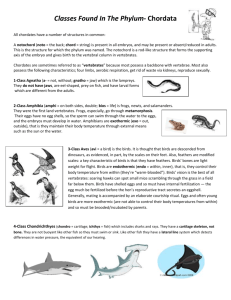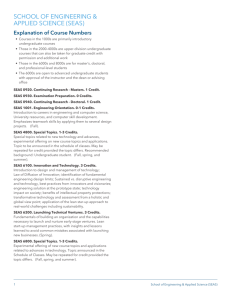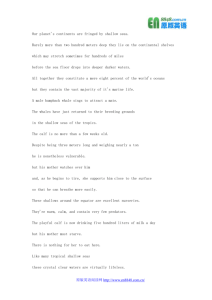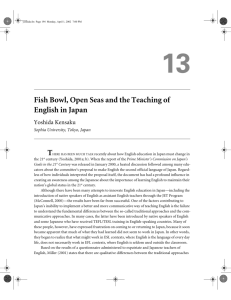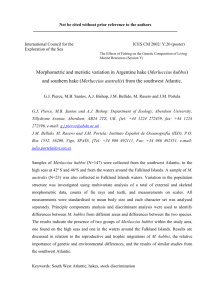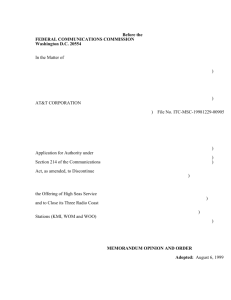P 1 Ch 2: …it becomes necessary to admit the - LMS-English-8
advertisement
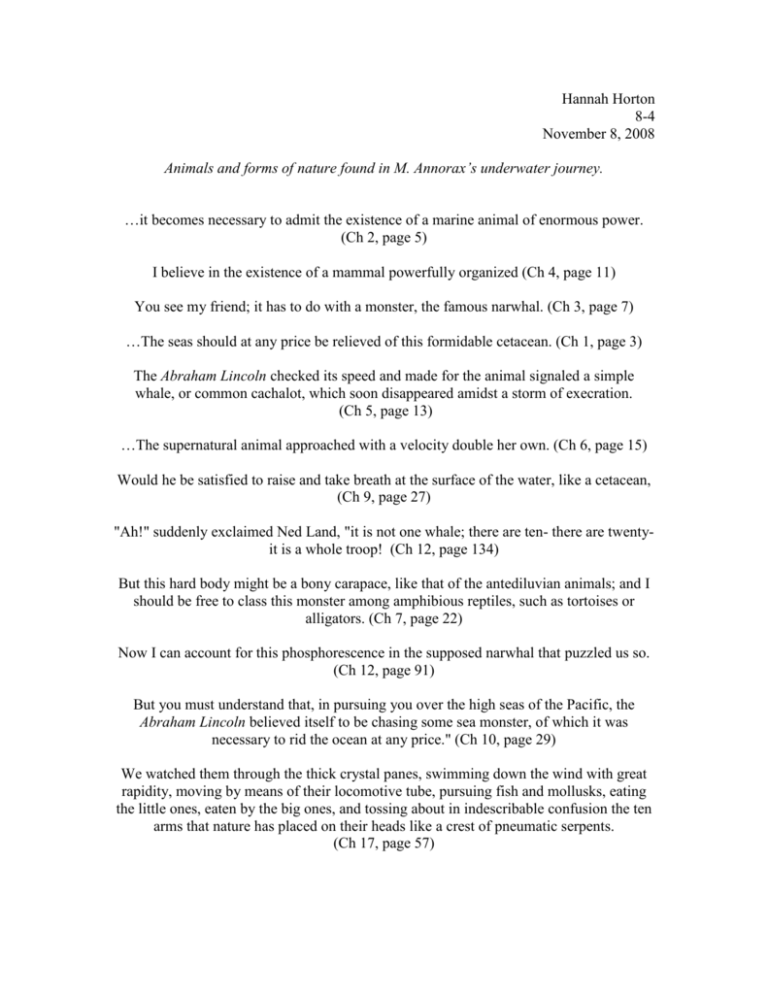
Hannah Horton 8-4 November 8, 2008 Animals and forms of nature found in M. Annorax’s underwater journey. …it becomes necessary to admit the existence of a marine animal of enormous power. (Ch 2, page 5) I believe in the existence of a mammal powerfully organized (Ch 4, page 11) You see my friend; it has to do with a monster, the famous narwhal. (Ch 3, page 7) …The seas should at any price be relieved of this formidable cetacean. (Ch 1, page 3) The Abraham Lincoln checked its speed and made for the animal signaled a simple whale, or common cachalot, which soon disappeared amidst a storm of execration. (Ch 5, page 13) …The supernatural animal approached with a velocity double her own. (Ch 6, page 15) Would he be satisfied to raise and take breath at the surface of the water, like a cetacean, (Ch 9, page 27) "Ah!" suddenly exclaimed Ned Land, "it is not one whale; there are ten- there are twentyit is a whole troop! (Ch 12, page 134) But this hard body might be a bony carapace, like that of the antediluvian animals; and I should be free to class this monster among amphibious reptiles, such as tortoises or alligators. (Ch 7, page 22) Now I can account for this phosphorescence in the supposed narwhal that puzzled us so. (Ch 12, page 91) But you must understand that, in pursuing you over the high seas of the Pacific, the Abraham Lincoln believed itself to be chasing some sea monster, of which it was necessary to rid the ocean at any price." (Ch 10, page 29) We watched them through the thick crystal panes, swimming down the wind with great rapidity, moving by means of their locomotive tube, pursuing fish and mollusks, eating the little ones, eaten by the big ones, and tossing about in indescribable confusion the ten arms that nature has placed on their heads like a crest of pneumatic serpents. (Ch 17, page 57) …we walked amidst a shoal of fishes of all kinds. (Ch 16, page 54) … Small fish, swimming swiftly, touched them slightly, like the flights of birds. (Ch 23, page 83) I had an opportunity of studying several species of fish on these shores. (Ch 17, page 156) I will not mention all the varieties which passed before my dazzled eyes, all the collection of the seas of China and Japan. (Ch 13, page 45) I also noticed some cheilines about nine inches long, a bony fish with transparent shell, whose livid, color is mixed with red spots; they are great eaters of marine vegetation, which gives them an exquisite flavor. (Ch 6, page 109) I saw then those magnificent birds, the disposition of whose long feathers obliged hem to fly against the wind. (Ch 20, page 69) It was an oyster of extraordinary dimensions, a gigantic tridacne, a goblet which could have contained a whole lake of holy water, a basin the breadth of which was more than two yards and a half, and consequently larger than that ornamenting the saloon of the Nautilus. (Ch 3, page 94) This dugong, which Ned Land was preparing to attack, was of colossal dimensions; it was more than seven yards long. (Ch 5, page 104) Magnificent sturgeons, nine or ten yards long, creatures of great speed, striking the panes of glass with their strong tails, displayed their bluish backs with small brown spots; they resemble the sharks, but are not equal to them in. strength, and are to be met with in all seas. (Ch 7, page 113) the glimmering peculiar to the medusa, starfish, Aurelia, and other phosphorescent zoophytes, impregnated by the grease of the organic matter decomposed by the sea, and, perhaps, the mucus secreted by the fish. (Ch 22, page 78) In the midst of this inextricable mass of plants and seaweed, I noticed some charming pink halcyons and actiniae, with their long tentacles trailing after them; (Ch 11, page 129) Frightful-looking poulps, interweaving their tentacles like a living nest of serpents. (Ch 9, page 123) One cannot deny that poulps and cuttlefish exist of a large species, inferior, however, to the cetaceans. (Ch 18, page 159) going up and down at the bottom of the sea, where one is almost certain to meet sharks, is quite another thing! (Ch 2, page 89) During the day, a formidable troop of sharks accompanied us, terrible creatures, which multiply in these seas, and make them very dangerous. (Ch 1, page 87) …parrots, like the rainbows of the ocean that could rival in color the most beautiful tropical birds. (Ch 19, page 163) Birds of prey hovered here and there in the shadows, or fled from their nests on the top of the rocks. (Ch 10, page 128) When the birds, driven away by the cold, have emigrated to the north, these sea mammals remain sole masters of the polar continent. (Ch 15, page 143) Among them glided sea elephants, a kind of seal, with short flexible trunks. (Ch 14, page 143) "What do you suppose they eat here? Tortoise liver, filleted shark, and beefsteaks from sea dogs." (Ch 8, page 26) "Every animal with four paws without feathers, or with two paws without feathers, will be saluted by my first shot." (Ch 19, page 66) Indeed, I shall not be sorry to eat a piece of fresh venison." (Ch 14, page 47) …his pig on one side, and kangaroos on the other, (Ch 21, page 71) The captain told me that formerly numerous tribes of seals inhabited them; but that English and American whalers, in their rage for destruction, massacred both old and young; thus where there was once life and animation, they had left silence and death. (Ch 13, page 136) I recognized magnificent rocks, hung with a tapestry of zoophytes of the most beautiful kind, (Ch 15, page 51) These are coral islands, slowly raised, but continuous, created by the daily work of polypi. (Ch 18, page 58) It was on the coast of Tehama, for there not only did this display of zoophytes flourish beneath the level of the sea, but they also formed picturesque interlacings which unfolded themselves about sixty feet above the surface, (Ch 4, page 98) …and close by, a vast charnel-house of mollusks or zoophytes, which perish here by millions. (Ch 20, page 167) No doubt, on board the Abraham Lincoln, when the Canadian struck it with the harpoon, Commander Farragut had recognized in the supposed narwhal a submarine vessel, more dangerous than a supernatural cetacean. (Ch 21, page 170) Thus, around the Nautilus, above and below, was an impenetrable wall of ice. (Ch 16, page 149) "The maelstrom!” (Ch 22, page 174) "It is marvelous!” (Ch 11, page 37) "Did you know, Sir," he asked, smiling, "that the sea contained such riches?" (Ch 8, page 119) Thus ends the voyage under the seas. (Ch 23, page 174) Lines compiled from the online text of 20,000 Leagues Under the Sea by Jules Verne.

